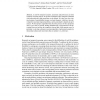Free Online Productivity Tools
i2Speak
i2Symbol
i2OCR
iTex2Img
iWeb2Print
iWeb2Shot
i2Type
iPdf2Split
iPdf2Merge
i2Bopomofo
i2Arabic
i2Style
i2Image
i2PDF
iLatex2Rtf
Sci2ools
113
click to vote
CP
2004
Springer
2004
Springer
Controllability of Soft Temporal Constraint Problems
In real-life temporal scenarios, uncertainty and preferences are often essential, coexisting aspects. We present a formalism where temporal constraints with both preferences and uncertainty can be defined. We show how three classical notions of controllability (strong, weak and dynamic), which have been developed for uncertain temporal problems, can be generalised to handle also preferences. We then propose algorithms that check the presence of these properties and we prove that, in general, dealing simultaneously with preferences and uncertainty does not increase the complexity beyond that of the separate cases. In particular, we develop a dynamic execution algorithm, of polynomial complexity, that produces plans under uncertainty that are optimal w.r.t. preference. 1 Motivation Research on temporal reasoning, once exposed to the difficulties of real-life problems, can be found lacking both expressiveness and flexibility. To address the lack of expressiveness, preferences can be ad...
Related Content
| Added | 01 Jul 2010 |
| Updated | 01 Jul 2010 |
| Type | Conference |
| Year | 2004 |
| Where | CP |
| Authors | Francesca Rossi, Kristen Brent Venable, Neil Yorke-Smith |
Comments (0)

